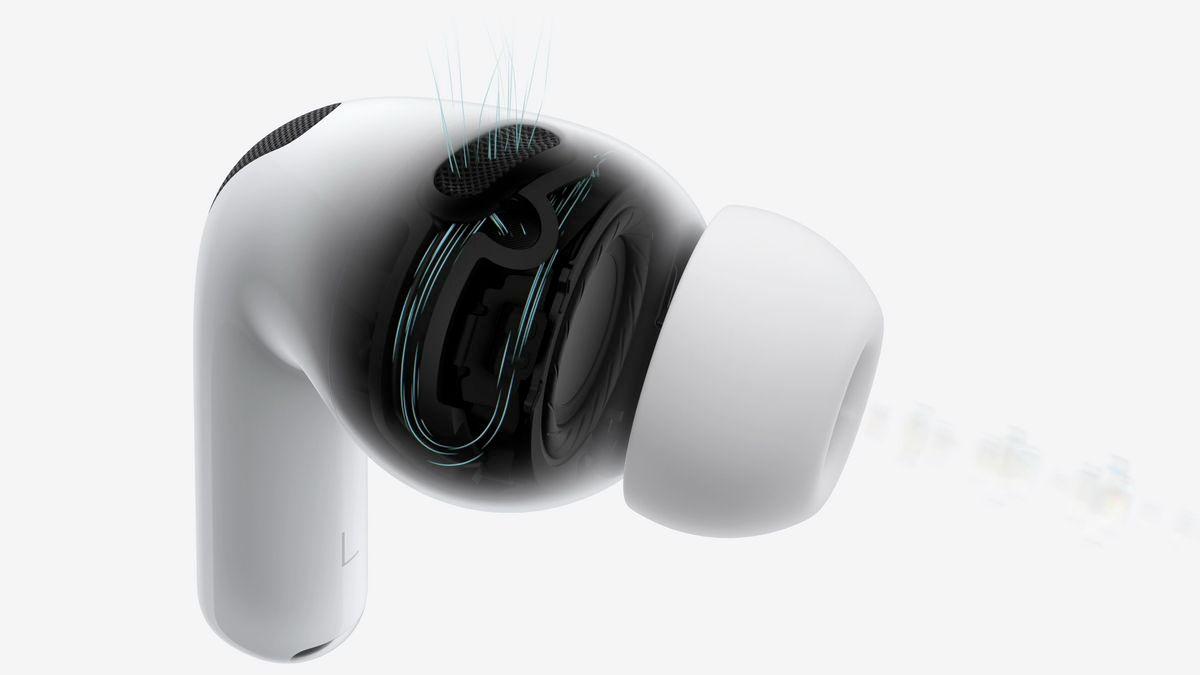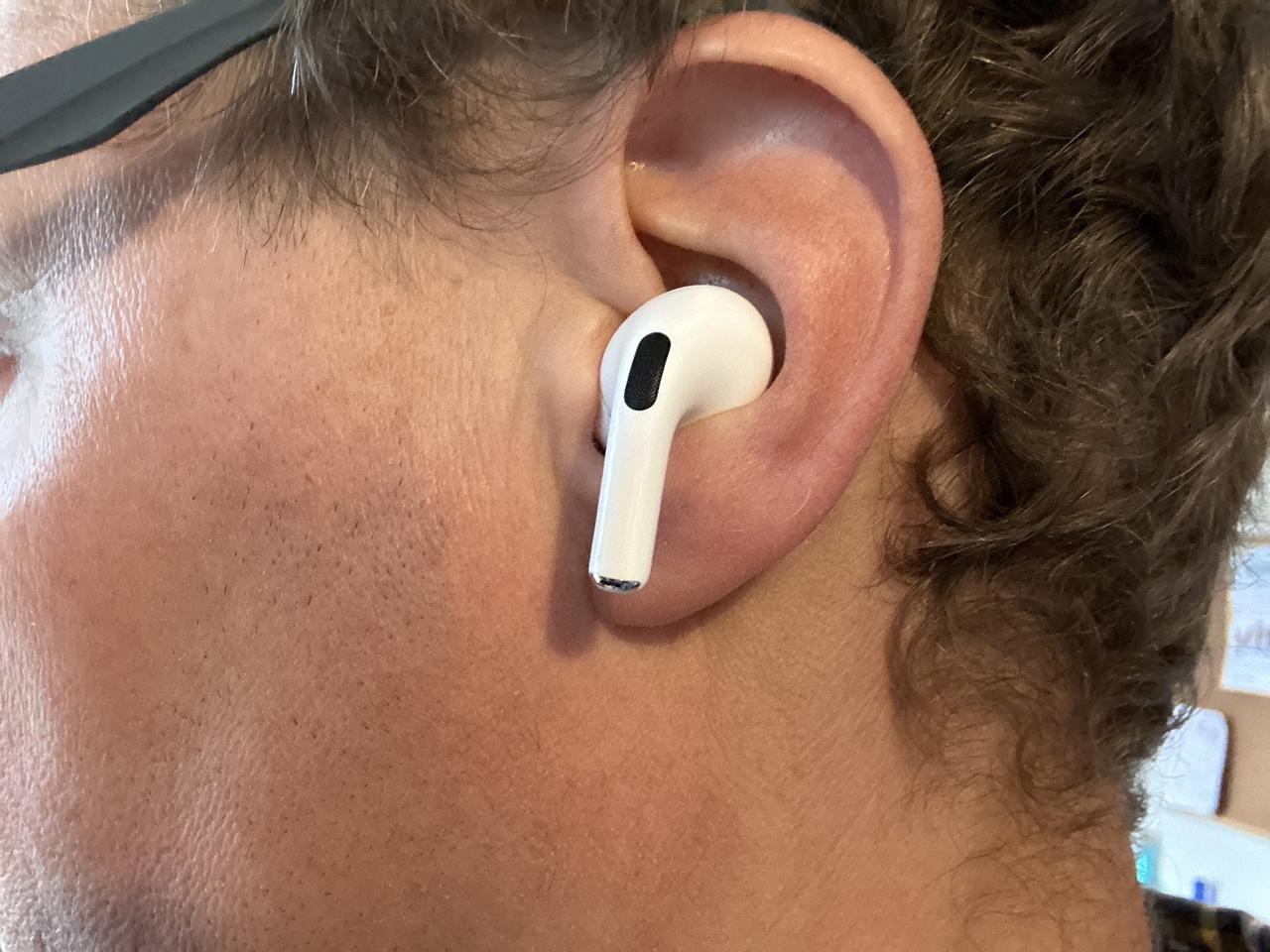Apple's Next-Gen AirPods: Integrating Cameras for Enhanced Vision Pro Experience and Beyond
2 Sources
2 Sources
[1]
How next AirPods could control Vision Pro with a wave of your hand
Apple is accelerating efforts to embed infrared cameras into future AirPods, targeting a 2026-2027 release to deepen integration with its Vision Pro headset and unreleased smart glasses, according to Bloomberg's Mark Gurman and analyst Ming-Chi Kuo. The cameras, functioning as environmental sensors rather than photo tools, aim to enable spatial audio personalization, hand-gesture controls, and health tracking -- marking AirPods' evolution from audio accessories to multifunctional wearables. The redesigned AirPods will incorporate infrared camera modules comparable to Apple's Face ID system, Kuo confirmed in a June 2024 analysis. When paired with the Vision Pro, these sensors will track head movements to dynamically adjust spatial audio. "If a user turns their head while watching a video, the sound source in that direction is emphasized," Kuo wrote, enhancing immersion for mixed-reality environments. Gurman's December 2023 and June 2024 reports add that the cameras could enable "in-air gesture control," allowing users to scroll menus or adjust volume via hand motions detected by the earbuds. Apple's patent filings reveal broader ambitions: a 2020 application describes offloading smart glasses' camera modules to AirPods to reduce facial wearables' bulk. Ear-mounted sensors would provide wider environmental data to glasses, while a 2023 internal project (codenamed B796) explores low-resolution cameras for real-time spatial mapping. This aligns with Apple Intelligence's roadmap -- sources note the IR cameras could feed environmental data to on-device AI, enabling context-aware adjustments to Vision Pro's audio-visual outputs. Is a budget Vision Pro on the way: Here's what Apple is planning Kuo estimates mass production could begin by 2026, contingent on overcoming miniaturization challenges. Engineers must shrink camera modules without compromising battery life or ergonomics -- a hurdle given AirPods' 5-6-hour active-use window. Apple's supply chain is reportedly testing infrared components from existing iPhone Face ID suppliers, though Gurman notes the project remains in "exploratory" stages. Delays could push the launch to late 2027, coinciding with the Vision Pro's second-generation rollout. Beyond cameras, Apple plans to integrate heart rate monitors and temperature sensors into AirPods, requiring users to wear both earbuds for accurate readings, per Gurman's April 2024 leak. Data would sync to the Apple Health app, positioning AirPods as competitors to fitness trackers. Patent filings detail additional sensors: a 2017 application outlines photoplethysmogram sensors for cardiovascular metrics, while a 2020 iteration describes capacitive sensors to detect hand gestures near a user's ears. A separate filing proposes workout tracking via motion sensors, though sources confirm these features remain in early testing. Apple's wearables team, led by COO Jeff Williams, views AirPods as critical to offsetting slowing iPhone sales. Gurman's February 2024 newsletter emphasized Apple's "relentless focus" on making AirPods a bridge between Vision Pro, rumored smart glasses, and iPhones. "The ears are a logical place to add sensors that other devices can't feasibly house," he wrote, noting Apple's 2023 hiring spree for optical engineering experts. Analysts speculate camera-equipped AirPods could retail for $349 -- $100 above the current AirPods Pro -- to reflect their expanded capabilities. Apple faces pressure to outpace rivals like Meta, which debuted camera-equipped Ray-Ban smart glasses in 2023. Patent disputes loom -- a 2020 Apple filing for "ear-worn environmental sensors" partially overlaps with a 2018 Amazon patent for gesture-controlled earbuds. Legal experts suggest Apple may license technologies to avoid delays. Meanwhile, supply chain leaks indicate Foxconn will assemble the camera modules, while Sony and LG Innotek vie to supply infrared sensors. Kuo notes Apple has secured "limited component capacity" for late 2026, signaling confidence in the project despite risks.
[2]
AirPods with cameras still a priority for Apple's computer vision goals | AppleInsider
Apple's AirPods could offer more than just sound, with the personal audio accessories still anticipated to gain cameras at some point in the future, and there's patent filings to prove it. Apple's work to increase the utility of its wearable devices could lead in a slightly offbeat direction for one product. The AirPods, typically an audio-based item, could one day house cameras to capture images of the local environment. In a Bloomberg newsletter on Sunday, a discussion of smart glasses includes references to other Apple products could be working on. The short list includes something like Meta's Ray-Ban glasses, but also "camera-equipped AirPods." The report doesn't go into any detail about the supposed AirPods, but a lot of previous reporting offers a compelling narrative for the rumored hardware. The concept of cameras in AirPods have been broached before by the publication. The most recent claim was on December 22, with cameras in the AirPods said to include IR-sensing versions. The December claims actually reiterated brief proclamations about camera AirPods from October 13. As for when to expect them, it is anticipated that camera-equipped AirPods could be two to three years away. Back in February 2024, Mark Gurman's newsletter insisted more work was being done in the wearables field by Apple, with mutltiple things on the horizon. Smart glasses like Apple Glass were a favorite for launch, as well as a smart ring, but also AirPods. It included a claim that project codename B796 related to AirPods with low-resolution cameras surfaced surfaced back in 2023. Bloomberg isn't the only venue for AirPods-camera discussions. In June, analyst Ming-Chi Kuo added to the claims that there would be AirPods with infrared camera modules, that could detect when a user turns their head. Due to there being multiple sources, this does help make the rumor seem more plausible. The addition of cameras to AirPods, even if they're only infrared versions, may not seem like an obvious idea from the outset. It's easier to consider the possibilities when the AirPods are used in concert with other devices. Think of them as cameras that can have data fed from them into other devices and software. One obvious way they could be employed is with smart glasses. Ideally, they would need as much information about the environment as possible, so cameras at the ears could offer a wider field of view for the hardware. This makes sense if you consider that smart glasses are ideally meant to be designed to be as light as possible, and ideally with as minimal weighty and distracting modules as possible. By offloading the cameras to the ears, this could keep the smart glasses from being too heavy or bulky for the user to wear. There has also been the claim that the cameras could feed data into an AI, such as a future version of Apple Intelligence on an iPhone. This could give Visual Intelligence-style features, without needing to fish the iPhone out of a pocket beforehand. In June, Kuo proposed that AirPods can be used to improve the Apple Vision Pro experience. The IR cameras could detect changes in the environment near to the user, which can be fed into the headset for processing the environment, and to help emphasize the audio related to what they're looking at. Aside from rumors and analysis, patent filings have previously offered glimpses of what Apple thinks it could do with AirPods. A lot of it basically revolves around shoving sensors into the earbuds of various kinds, not just cameras. In October 2020, there was the claim that AirPods could understand no-touch sensors by detecting when hands are near the user's ear. While a lot of the filing mentioned capacitance, an IR camera would perform the same job. Going back to 2017, a set of filings proposed ways to add more sensors to the earbuds, including a photoplethysmogram sensor for monitoring a user's heartrate. Galvanic skin responses, an electrocardiogram sensor, and VO2 could feasibly be measured too. There's even been the proposal of pose detection and workout tracking as well. Obviously, Apple has a lot of plans for the expansion of its wearable devices. The inclusion of cameras on AirPods may not be intuitive to consumers at face value, but it could be a key development that can assist a lot more hardware in the future.
Share
Share
Copy Link
Apple is developing AirPods with built-in infrared cameras, aiming to deepen integration with Vision Pro and future smart glasses. The new features could enable spatial audio personalization, gesture controls, and health tracking.

Apple's Vision for Next-Generation AirPods
Apple is pushing the boundaries of wearable technology with its plans to integrate infrared cameras into future AirPods. This ambitious project, slated for a potential 2026-2027 release, aims to transform AirPods from mere audio accessories into multifunctional wearables that seamlessly integrate with the Vision Pro headset and rumored smart glasses
1
.Enhanced Spatial Audio and Gesture Control
The redesigned AirPods will incorporate infrared camera modules comparable to Apple's Face ID system. When paired with the Vision Pro, these sensors will track head movements to dynamically adjust spatial audio, enhancing immersion in mixed-reality environments
1
. Additionally, the cameras could enable "in-air gesture control," allowing users to scroll menus or adjust volume via hand motions detected by the earbuds1
.Expanding Functionality Beyond Audio
Apple's patent filings reveal broader ambitions for AirPods. A 2020 application describes offloading smart glasses' camera modules to AirPods to reduce facial wearables' bulk
1
. This aligns with Apple's roadmap to use IR cameras for feeding environmental data to on-device AI, enabling context-aware adjustments to Vision Pro's audio-visual outputs1
.Health and Fitness Integration
Beyond cameras, Apple plans to integrate heart rate monitors and temperature sensors into AirPods
1
. Patent filings detail additional sensors, including photoplethysmogram sensors for cardiovascular metrics and motion sensors for workout tracking1
. These features position AirPods as potential competitors to fitness trackers.Technical Challenges and Production Timeline
Analysts estimate mass production could begin by 2026, contingent on overcoming miniaturization challenges
1
. Engineers must shrink camera modules without compromising battery life or ergonomics. Apple's supply chain is reportedly testing infrared components from existing iPhone Face ID suppliers, though the project remains in "exploratory" stages1
2
.Related Stories
Strategic Importance for Apple
Apple's wearables team views AirPods as critical to offsetting slowing iPhone sales
1
. The company sees AirPods as a bridge between Vision Pro, rumored smart glasses, and iPhones. This strategy is reflected in Apple's 2023 hiring spree for optical engineering experts1
.Market Position and Competition
Apple faces pressure to outpace rivals like Meta, which debuted camera-equipped Ray-Ban smart glasses in 2023
1
. The camera-equipped AirPods could retail for $349, reflecting their expanded capabilities1
. Patent disputes may arise, as Apple's filings for "ear-worn environmental sensors" partially overlap with existing patents from competitors1
.Supply Chain and Production
Supply chain leaks indicate Foxconn will assemble the camera modules, while Sony and LG Innotek vie to supply infrared sensors
1
. Apple has reportedly secured "limited component capacity" for late 2026, signaling confidence in the project despite risks1
2
.As Apple continues to innovate in the wearable technology space, these camera-equipped AirPods represent a significant step towards creating a more interconnected and immersive ecosystem of devices. The success of this project could redefine the boundaries of personal audio technology and strengthen Apple's position in the evolving landscape of augmented and mixed reality.
References
Summarized by
Navi
Related Stories
Recent Highlights
1
Pentagon threatens Anthropic with Defense Production Act over AI military use restrictions
Policy and Regulation

2
Google Gemini 3.1 Pro doubles reasoning score, beats rivals in key AI benchmarks
Technology

3
Anthropic accuses Chinese AI labs of stealing Claude through 24,000 fake accounts
Policy and Regulation








